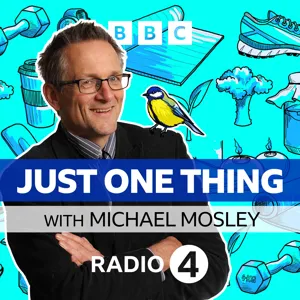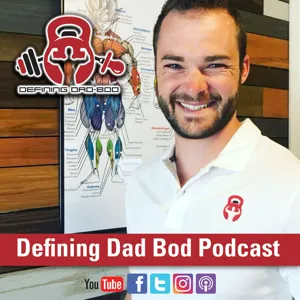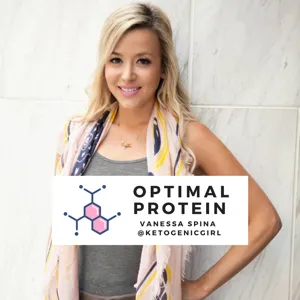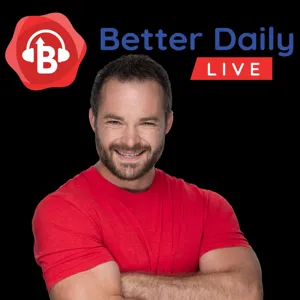Podcast Summary
Our genes influence our food preferences and eating behavior: Half of our eating behavior is influenced by genes and biology, making some of us more likely to overeat
Our genes play a significant role in how and why we eat, and ultimately, whether or not we gain weight. According to professor Giles Yeo from Cambridge University, our genes influence our food preferences, making some of us more likely to overeat. The variation in our eating behavior is not only due to cultural and sociological reasons but also our biology. The research shows that more than half of the reason why we eat as much as we do is due to our genes and biology. Our genes can make us more vulnerable to overeating and alter our food preferences. This knowledge can help us understand why some people respond to stress by eating more, while others don't. It's important to note that this doesn't mean that someone eats twice as much due to their genes, but rather that our genes make some of us less likely to say no to food. This information can provide insight into why some people struggle more than others to maintain a healthy weight and emphasizes the importance of genetics in weight management.
Focusing on food choices for weight management: Genetics influence weight, but daily food choices significantly impact weight loss and maintenance. Nutritional content matters, as the body processes different foods differently.
While body weight is influenced by genetics, daily food choices play a significant role in weight loss and maintenance. Eating a little more than necessary each day can lead to substantial weight gain over time. Losing weight is challenging for everyone, but the difficulty can vary greatly. Genetics set a range of possibilities, but individual choices can help nudge the outcome. When it comes to eating, focusing solely on calories is not enough. The nutritional content of food is crucial, as the body processes different foods differently. For instance, a 200-calorie chocolate bar is not the same as 200 calories of broccoli or steak. Thus, making informed food choices is essential for successful weight management.
Not all calories are equal in how they're used by the body: Considering the source and quality of calories can help inform food choices and maintain a healthy weight
Not all calories are created equal. While the number of calories in a candy bar and a serving of sweet corn may be the same, the way our bodies process and utilize these calories can vary greatly. The availability of calories from different macronutrients, such as carbohydrates, proteins, and fats, can differ significantly. For instance, only about 70% of the calories in protein are actually absorbed by the body, compared to nearly 100% of the calories in sugar. Additionally, the way food is prepared can also impact its calorific value. For example, dried and processed cornmeal contains more available calories than raw sweet corn. Therefore, it's essential to consider the source and quality of the calories we consume, rather than just focusing on the calorie count. This can help us make more informed food choices and maintain a healthy weight over time. As a medical student, I experienced firsthand how easy it is to gain weight as we age, often without even noticing. The average weight gain from age 20 to 50 is around 15-20 kilograms. By understanding the complexities of calories and how they affect our bodies, we can make more informed choices and take steps to maintain a healthy weight and overall wellbeing.
Maintaining a healthy weight is key to preventing weight gain: Focusing on healthy habits during childhood and being aware of lifestyle changes in adulthood can help prevent weight gain, while exercise plays a crucial role in maintaining weight once lost.
Preventing weight gain is easier than trying to lose weight once it has been gained. While it may be difficult to eliminate weight gain entirely, focusing on maintaining a healthy weight during childhood and being aware of lifestyle changes that contribute to weight gain in adulthood can help slow down the trajectory. Exercise plays a crucial role in maintaining weight once it has been lost, despite being less effective for weight loss itself. The misconception that exercise makes you burn more calories than you actually do can lead to overeating and negating the benefits of physical activity. While some people may find it challenging to lose weight through exercise alone, the focus should be on making sustainable lifestyle changes rather than seeking quick fixes.
Focus on overall health and well-being, not just weight loss: Exercise for health benefits, not just weight loss. Consider various health indicators and prioritize mental health.
Focusing solely on weight loss through exercise and the number on the scale can be misleading and may lead to disappointment and giving up. Instead, it's essential to prioritize overall health and well-being. Exercise plays a crucial role in maintaining weight loss and improving mental health, but it may not be the most effective tool for initial weight loss due to a temporary increase in metabolic rate. Giles Yeoh, a researcher in this area, emphasizes the importance of considering various health indicators, such as blood pressure and ability to perform daily tasks, rather than just weight. Additionally, exercise provides mental health benefits, which can help individuals avoid turning to food for stress relief. In summary, prioritize health and well-being over weight loss, and use exercise as a tool for maintaining weight loss and improving overall health.
Discovering the link between genetics and obesity: Giles Yeo's career in obesity research began by chance and led to the discovery of the complex role genetics play in body weight through brain influence. Sustainable diets that promote overall health are most effective.
Professor Giles Yeo's career in obesity research began by chance over 26 years ago when he knocked on the door of Professor Stephen O'Rackley, who was on the brink of discovering genes linked to severe obesity. Giles became fascinated by the complex nature of body weight genetics and its connection to the brain. Regarding diets, Giles emphasizes that there is no one-size-fits-all solution. Instead, individuals should find a diet that they can stick to and is healthy for them. Originally, researchers believed that obesity was primarily caused by energy expenditure, but they later discovered that genetics play a significant role in body weight through brain influence. Giles' research journey has shown that diets work best when they are sustainable and beneficial for overall health.
Diets Vary for Each Individual: Embrace a balanced diet rich in protein, fiber, and plant-based foods, avoiding orthorexia and extreme diets.
There is no one-size-fits-all perfect diet for everyone. While the Mediterranean diet, which emphasizes oily fish, fruit, veg, nuts, full fat yogurt, and fermented foods, is a healthy choice for many, it may not lead to significant weight loss. A healthier way of living, in general, would involve eating more protein, fiber, and fewer refined carbs. However, it's essential to remember that everyone is unique, and what works for one person may not work for another. Another important point discussed was the potential danger of orthorexia, a modern eating disorder characterized by an unhealthy obsession with eating correctly. This fear of not eating according to a specific, self-prescribed diet can be just as harmful as anorexia or bulimia. Therefore, aim for a balanced diet rich in protein, fiber, and plant-based foods, but don't feel guilty if a vegan diet doesn't suit you. And, as a bonus, feel free to enjoy the occasional glass of red wine!
Ensure a Balanced Vegan Diet: Going vegan for health requires focus on whole, nutrient-dense foods, addressing potential nutrient deficiencies, and creative ways to enjoy veggies.
While going vegan for health, ethical, or environmental reasons can be beneficial, it's essential to make sure you're consuming whole, nutrient-dense foods rather than relying on ultra-processed vegan options. For health reasons, vegans need to pay extra attention to getting enough vitamin B12, iodine, and iron, as these nutrients are primarily found in animal products. While some people may find it easier to stick to a vegan diet due to their genetics, others may struggle. For those who don't enjoy vegetables, finding creative ways to incorporate them into favorite dishes, like vegan lasagna or ragu, can help make the transition smoother. Remember, just because a food is vegan doesn't automatically make it healthy. It's all about making informed choices and ensuring you're getting a balanced diet.
Eating more vegetables, legumes, and fewer portions of meat: Making small adjustments to incorporate more plant-based foods and fewer meat portions can lead to healthier eating, weight loss, and environmental benefits.
Incorporating more vegetables, legumes, and fewer portions of meat into your diet can lead to healthier eating and a positive impact on the environment. This doesn't mean eliminating meat entirely, but rather making small adjustments, such as having meat-free days or reducing meat consumption in certain meals. This approach can result in weight loss and improved health without compromising enjoyment. It's essential to remember that the primary goal should be to prioritize health over aesthetics. Losing weight to improve overall well-being is a more significant concern than achieving a certain look. As the speaker mentioned, their personal experience with a vegan diet led to weight loss and better health. However, it's important to remember that a plant-based diet may not be suitable for everyone, and finding a balance that works for your lifestyle is crucial.
Maintaining weight loss for overall health: Effective weight loss strategies involve strong health motivations and empathetic support, not just appearance.
Maintaining weight loss goes beyond just looking good or feeling better; it's about preserving overall health. Personal experiences of increased health risks, such as higher blood sugar and pressure, can serve as powerful motivators. However, it's important to acknowledge the body positivity movement and its argument that health and weight are not directly linked for everyone. Yet, exceeding one's personal safe fat carrying capacity can lead to health issues. Effective strategies for weight loss involve having strong motivations rooted in health improvements and receiving empathetic support during the process. Telling someone they need to lose weight is not an effective approach. Instead, encouraging open discussions and allowing individuals to come to their own decisions can lead to successful and sustainable weight loss.
Find a diet that suits your biology and lifestyle: Explore options, focus on exercise, eat more plants, and maintain weight loss for health benefits
There isn't a one-size-fits-all solution when it comes to weight loss and diets. Professor Giles Yeo emphasized that it's crucial to find a diet that suits your biology and lifestyle to ensure long-term success. While increasing protein, fiber, and water intake, as well as cutting calories, can help with weight loss, it's essential to remember that every person is unique. The experts also advised focusing on maintaining weight loss through exercise, eating more plants, and losing weight for health benefits rather than just for appearance. Ultimately, the key is to explore different options and find what works best for you.
Affordable luxury with ethical manufacturing: Quince provides high-quality, luxurious products at affordable prices while ensuring safe, ethical, and responsible manufacturing
Quince offers high-quality, luxurious products at affordable prices. Their range includes buttery soft cashmere sweaters, as well as Italian leather bags, all while ensuring safe, ethical, and responsible manufacturing. This means consumers can enjoy the finer things in life without breaking the bank. Quince's commitment to ethical business practices also gives shoppers peace of mind, knowing their purchases support fair labor and sustainable production methods. So, whether you're in the market for a new sweater or a stylish bag, Quince is an excellent choice for those who value quality and affordability. Go to quince.com/style to explore their offerings and enjoy free shipping and 365-day returns.








